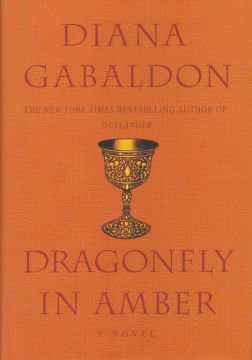 Dragonfly in Amber is Book Two in the Outlander series by Diana Gabaldon. After rereading Outlander at the end of the year in 2017, I’ve decided to try and get as far in the series as I can. Last time I read them, I got 75% of the way through Book Three before I lost interest and stopped reading (to be fair, I was reading on an ereader, which is my least favorite form to read in). I am hoping to get further this time through.
Dragonfly in Amber is Book Two in the Outlander series by Diana Gabaldon. After rereading Outlander at the end of the year in 2017, I’ve decided to try and get as far in the series as I can. Last time I read them, I got 75% of the way through Book Three before I lost interest and stopped reading (to be fair, I was reading on an ereader, which is my least favorite form to read in). I am hoping to get further this time through.
At the end of Book One we are left with Jamie (mostly) free of his demons brought on by Jack Randall, and Claire and Jamie are finally back on sure footing again in their relationship. Jamie is again an outlaw in Scotland, and the pair of them are deciding what they want to do in their future. Book Two drops us twenty and two hundred years later, left wondering wtf happened?? And the rest of the book explains how things ended up the way they did.
The structure of Dragonfly in Amber is very different from Outlander. Book One was very linear. It was entirely in Claire’s perspective, and followed her incredible journey through time. Book Two begins in an entirely different time and place: Claire is in her present day, back in Scotland (though she’s lived in America for twenty years) with her daughter, Brianna. Claire’s husband Frank has died, and she is trying to figure out the best way to tell her daughter about her true father, James Fraser, a Scottish Highlander from the 18th century she never knew about. We get most of this story from the perspective of a relative stranger, Roger Wakefield, who we met only briefly in book one as a young orphan. Once the truth about Brianna’s origins is revealed, Claire tells them the story from where book one left off.
In the story within a story there are two distinct parts, the first half or so Jamie and Claire spend in France, trying to thwart the efforts of ‘Bonny Prince Charlie’ Charles Stewart. Because they know of the horrible tragedy of Culloden, they will risk their lives to prevent it from happening. There is a lot of contrast between their time in France and their previous adventures in the Scottish highlands. France is all about subtleties, flattery, espionage, and straddling the lines between both sides without drawing suspicion. In the second half, the couple returns to Lallybroch with a pardon for Jamie from King George. Thinking that they’ve done everything they can, and not seeing how Charles Stewart can continue on the path to Culloden, they feel at peace at Lallybroch. That is, until Prince Charles sends a summons to war a few months later out of the blue, a sign that things hadn’t changed after all.
As the second book in the series, this structure felt uncomfortable for me. The first sentence, in fact, completely shatters the entire build-up of overcoming the demon that is Jack Randall in the finale of book one. The decision for the author to jump 20 years in the future from page one in this novel was pretty upsetting for me. It was completely unexpected, especially considering this is the second book in pretty long series. It just seemed like an odd choice by the author. I still felt shaken by it reading it for the second time, even though I obviously knew the whole time what was coming. It’s just very jolting for the reader. Did anyone else feel that way? It’s a hard thing for me to get over. There is also the fact that we know from the beginning that Claire made it back to her present, and that history did not, in fact, change. So all of the narrative of the past when the characters are trying so hard and risking everything to change things, we already know it’s for nothing. Perhaps it could have been more powerful if the reader had a sense that there was at least a chance that history could be changed.
There is very little movement while the characters are in France, just lots of dinner parties and generally staying in the same area. Perhaps part of that was too different from Outlander for me. At times, I felt that Jamie wasn’t necessarily acting like himself, and maybe that was only because he’s a Scottish Highlander and is meant to be free roaming through the heather of home. I felt like the true spark of the relationship between Jamie and Claire was missing for much of that section while the author was busy introducing us to a whole new cast of characters and conflicts. Although many of the French characters were vibrant and memorable, I was still left at the end of it wondering what the whole point of it was. But maybe that was the goal – Claire and Jamie were unable to change anything there, so it was all futile. But still, it sort of felt like a waste of time.
One of the things I loved about Outlander was how Diana Gabaldon gave everything a reason and an explanation. I was largely missing that in this book. Things just seemed to happen, and for a long stretch I didn’t really care about any of it because the stakes weren’t very immediate. I don’t know exactly what it was, perhaps the pace of the passage of time, where sometimes a sentence or paragraph would cover several weeks, and then we’d be given a detailed scene of something that seemed insignificant. It left me wondering sometimes what it was about what was shared that made it important, because I didn’t see it much of the time. Murtagh bothered me too. I love his character, and although he was in France with them, he was only ever merely mentioned until it was convenient for him to play a real role (past the 30% mark). It just felt like he was dropped in as an afterthought in some of the later edits so his role later would work. There were also a lot of dreams in book two, a red flag for any writer. I know Dragonfly in Amber was published the year after Outlander, so it begs the question in my mind if the author just didn’t spend as much time perfecting it as she did with book one.
While I didn’t much like the bits in France, there was quite a lot about this novel I did like. After the initial shock of the circumstances that begin this novel, I very much enjoyed the 1960s portion, where Claire has to tell her daughter and the descendant of her friend about what happened to her and who they truly are. Roger Wakefield is a very likeable character, and his attraction to Bree adds in a whole new layer of romance to the story. I have heard he plays a role later in the series as well, which I am glad for. The Geillis Duncan plot line takes the story in the present from pretty good to stinkin’ awesome. Using one of the most effective characters from Outlander (the vaccination scar revelation still gives me goosebumps just thinking about it) to essentially prove the truth of her story to the unbelievers in the present (while adding a mini mystery/adventure to boot) was supremely clever.
I vastly preferred the portion of the story that took place in Scotland. I’ve always liked books with wars in them. I’ve never looked too deep into why that might be, but while they’re usually upsetting, the stories of those who lived through them (even fictionally) are always moving. Before reading these novels, I knew absolutely nothing about Scottish history, so that aspect of it was interesting to read and learn about. It also felt more like book one, as many plot elements started coming together, especially the mystery of Frank’s existence despite Jack Randall’s lack of ability to sire his ancestor.
A little randomly I want to share my favorite line from the book – mainly for myself looking back at this post. Spoiler Alert, big time. I don’t love it for the line in itself, but what it represents and the whole context of the scene it’s in:: “Name him Brian, after my father.” I mean, 😭😭😭 That single line is what made the scene so powerful for me. All the feels, as they say. Of course, you already know the child’s name: Brianna. BRIANna. And it sums up Jamie’s character so well too, those last moments in the cottage. That he would (and did already, by killing his uncle) sacrifice his entire life, everything he is or ever was, to protect his wife and his child. I have to say, Gabaldon knows how to create one hell of a powerful moment. It just took a lot of slogging in the beginning/middle to get to those in this novel.
Despite a bumpy beginning, the ultimate ending of this book was very satisfying and definitely built up enough momentum make me start the next book in the series, even though I’d planned to take a break before continuing. The Voyager review shall be along soon friends 😉


1 Comment